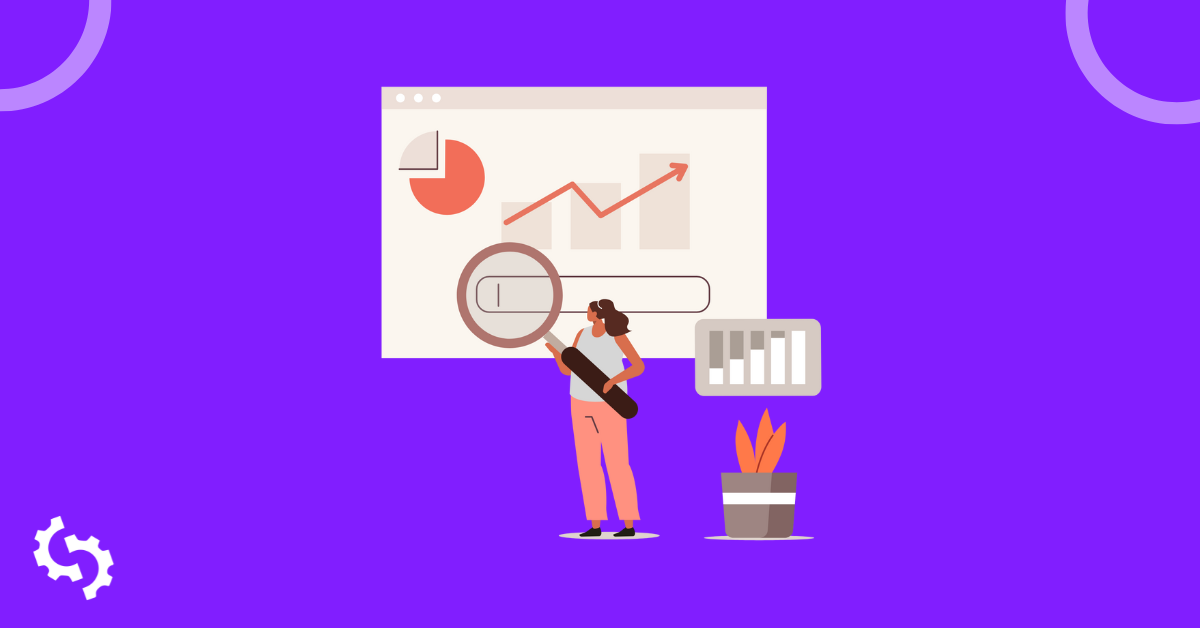
Search Engine Optimization (SEO) remains an essential strategy for businesses aiming to increase their online visibility.
But, with its technical jargon and constant updates, SEO can often leave even the most tech-savvy marketers and business owners scratching their heads.
That's why we've put together this comprehensive guide, answering 30 of the most frequently asked questions about SEO. From the basics to the complex, we'll answer some of the most common SEO FAQs.
General SEO FAQs
What is SEO?
SEO, or Search Engine Optimization, is a powerful digital marketing strategy that focuses on enhancing a website's visibility in organic search engine results. It encompasses both technical and creative elements required to improve rankings, drive traffic, and increase awareness in search engines.
Here's how it works:
- Keywords: SEO involves identifying the terms people are searching for, known as keywords, and incorporating them into your website content. This helps search engines understand what your site is about and rank it accordingly.
- Quality Content: Creating engaging, informative content is key. It not only attracts visitors but also encourages them to stay longer on your site, reducing bounce rate and increasing the chances of conversion.
- Link Building: This involves having other reputable websites link to your site, which boosts your credibility in the eyes of search engines.
- Website Optimization: A user-friendly website with fast load times, clear navigation, and mobile-friendly design is more likely to rank higher in search results.
In essence, SEO is about making your site attractive to both users and search engines.
It's not just about building search-engine friendly websites, but also about making your site better for people too. The ultimate goal of SEO is to connect with those searching for what you offer, leading to an increase in potential conversions and business growth.
Is SEO Dead?
No, SEO is not dead. This question, frequently echoed in digital marketing circles, is born out of the rapidly changing landscape of search engine algorithms and the rise of new technologies and platforms.
SEO is not dead, but it has indeed evolved - and continues to do so.
Let's take a closer look at the data-driven reasons behind this:
- The Power of Organic Search: According to BrightEdge, organic search drives 53% of all website traffic. This statistic alone underscores the importance of SEO in directing users to your site. If SEO were dead, we wouldn't see such a significant percentage of traffic coming from organic search.
- User Behavior and Search Queries: Data reveals that 15% of daily searches are unique, meaning they've never been searched before. This constant stream of new queries provides ongoing opportunities for websites to attract traffic through SEO.
- Mobile Optimization: With over 50% of global web traffic coming from mobile devices, having a mobile-friendly website is crucial. SEO plays a key role in ensuring your site is optimized for mobile users.
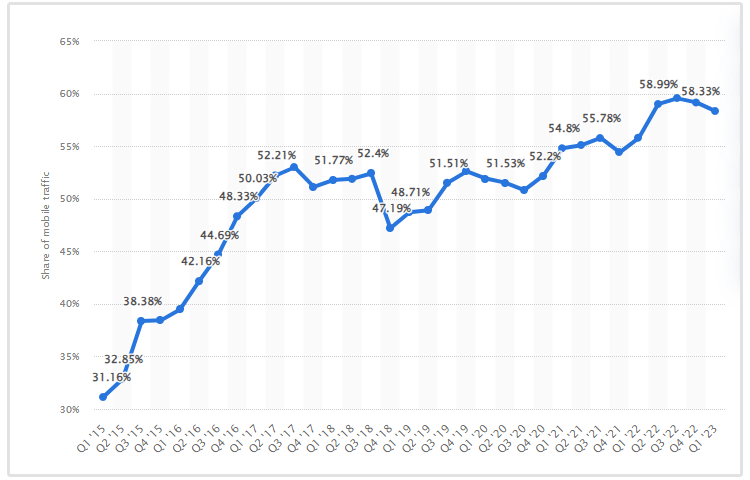
- Local SEO: The 'near me' search trend has seen a 500% growth in the last two years, as reported by Think with Google, highlighting the importance of local SEO for businesses to attract local customers.
We can conclude that as long as search engines exist, and people use them to find information, products, or services, SEO will continue to be a vital part of any digital marketing strategy. It may evolve, and the techniques used may change, but the core principle of optimizing your online presence to increase visibility in search results remains as important as ever.
Does SEO Still Work?
Yes, SEO still works. SEO continues to be a crucial strategy for improving a website's visibility, driving traffic, and increasing conversions. Let's delve into a real-life example that underscores the efficacy of SEO.
Consider the case of Canva, a graphic design platform. By implementing a robust SEO strategy, they were able to achieve remarkable growth.
The result? According to several case studies, Canva's organic search traffic grew to over 150 million and has millions of backlinks pointing to its domain. Furthermore, their leads and conversions significantly increased, contributing to exponential business growth.

So, does SEO still work? This real-world example clearly demonstrates that it does. When implemented effectively, SEO can significantly increase a site's traffic, leads, and conversions, making it an essential component of any digital marketing strategy.
How Does SEO Work?
Understanding how SEO works is crucial to improving your site's visibility and driving more organic traffic.
Search engines use 'website crawlers' or 'spiders' to explore the web. These crawlers scan your site's content and structure. As part of your SEO strategy, you need to ensure that these crawlers can access your content properly. This process is called 'crawling.
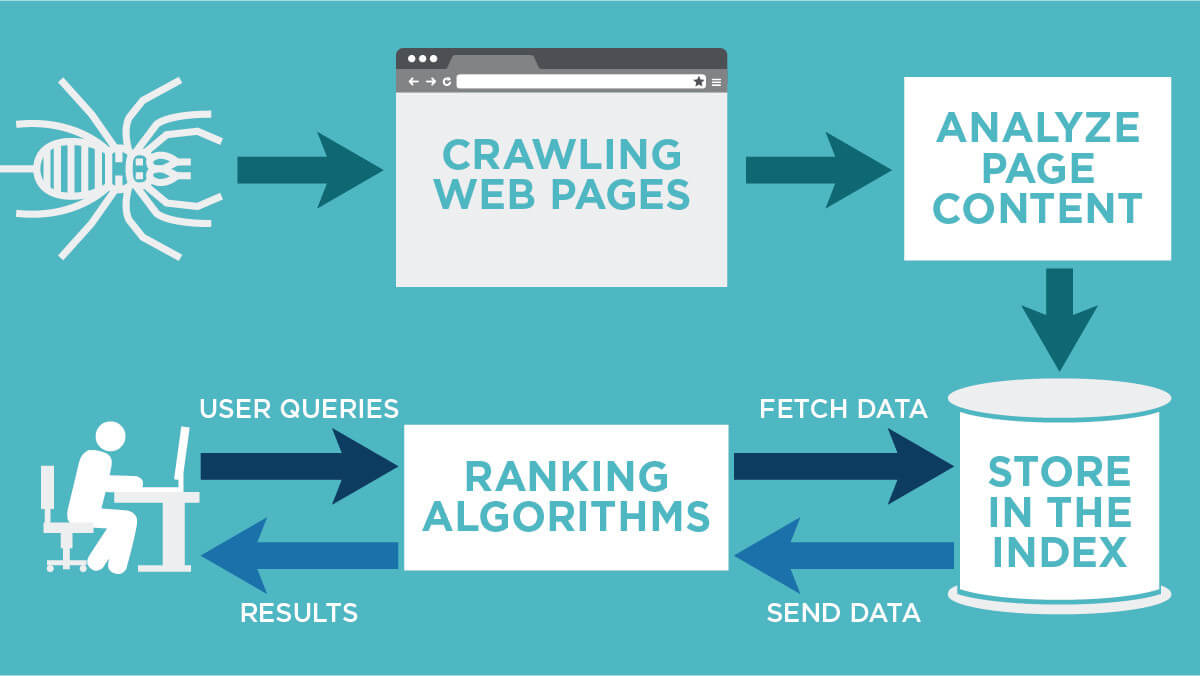
Image source: eCreative Works
Google’s search algorithm determines the intent behind each query (i.e., what searchers want).
Search algorithms consider many factors and signals, including the words of your query, relevance and usability of pages, expertise of sources, and your location.
Some of these ranking factors are under your control. So you can work to ensure Google’s algorithm views your content more favorably. This involves optimizing elements such as keywords, meta descriptions, and quality content to align with what search engines and their users are looking for.
How Long Does it Take to Rank on Google?
SEO is a long-term strategy, and it typically takes about 3-6 months to start seeing results.
However, this timeframe can vary depending on several factors like the competitiveness of your industry, the quality of your content, and the effectiveness of your overall SEO strategy.
Remember, SEO isn't just about quick wins - it's about building sustainable growth over time. Consistent effort and patience are key to successful SEO.
Why isn’t My Website Showing on Google?
If your website isn't showing up in Google search results, there could be a few potential reasons:
- Your Site Isn't Indexed by Google: It's crucial to ensure that Google has indexed your site. You can verify this by typing "site:" followed by your website URL into the Google search bar. If your site is indexed, its pages will appear in the search results. If not, you can request indexing through Google's Search Console.
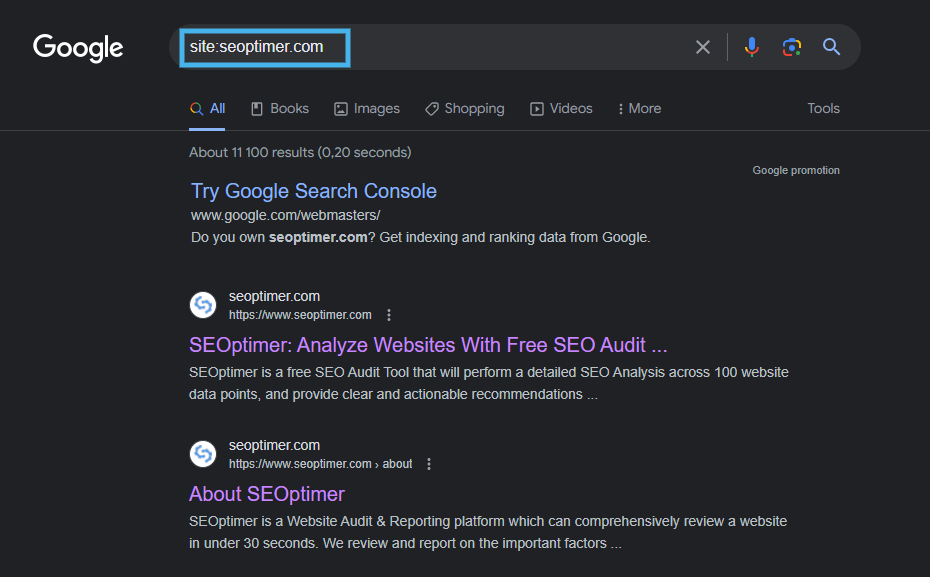
- Poor Keyword Targeting: Your website might not be visible due to incorrect keyword usage. Google matches search queries with websites based on keywords. If your site isn't using the right keywords, or if they're not used correctly, your site might not show up for relevant searches. Proper keyword research and optimization are pivotal for visibility.
- Low-Quality Content: Google prioritizes high-quality, relevant content. If your content is poor or doesn't provide value to users, this could negatively impact your search ranking. Regularly updating your site with fresh, engaging content can improve your visibility.
- Technical SEO Issues: Technical issues like slow loading times, mobile-unfriendliness, or broken links could be preventing your site from appearing in search results. Regular audits can help identify and fix these issues.
What is White-Hat SEO?
White-Hat SEO refers to the ethical tactics used to improve a website's search rankings, in line with the rules set by search engines.
This involves using relevant keywords, producing high-quality content, earning reputable backlinks, and optimizing the site's architecture for user-friendliness and responsiveness.
It's a strategy that focuses on providing real value to users, maintaining the integrity of the site, and building a sustainable online presence.
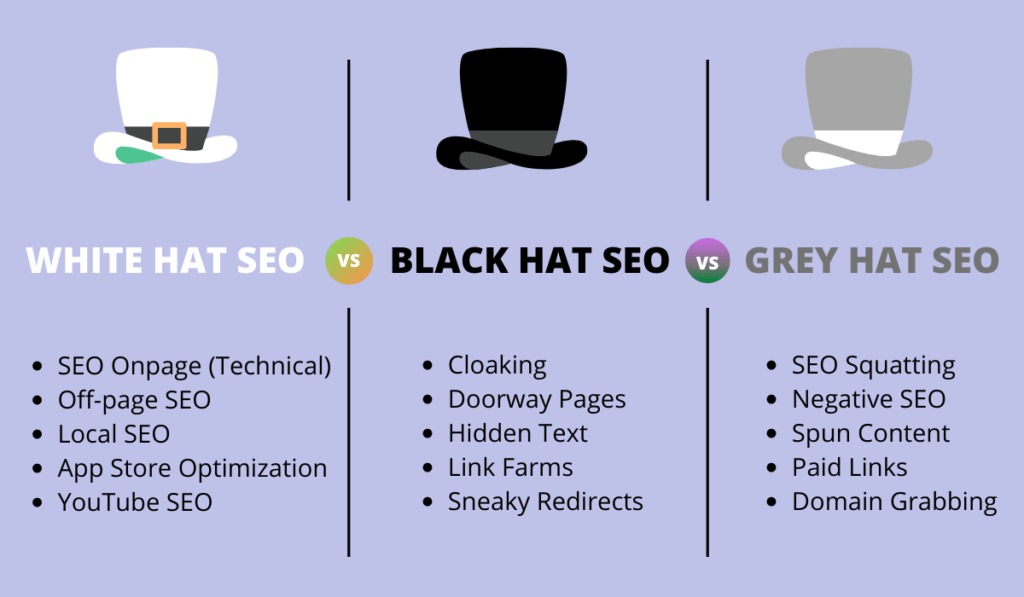
Image source: Medium
What is Black-Hat SEO?
Black-Hat SEO refers to the unethical practices used to improve a website's search rankings that violate search engine guidelines.
These tactics, such as keyword stuffing, hidden text, and link schemes, aim to manipulate search engine algorithms rather than providing value to users.
While they may offer short-term gains in ranking, they pose a risk of penalties, including lowered rankings and even removal from search results.
It's crucial for sustainable online presence to avoid Black-Hat SEO and adhere to accepted SEO practices.
What is the Difference Between SEM and SEO?
SEO focuses on improving a website's organic search rankings. The goal of SEO is to make a website more appealing to search engines, so it ranks higher in organic (non-paid) search results.
SEM encompasses both organic and paid search strategies. While it includes SEO efforts, SEM primarily relies on paid advertising to increase visibility.
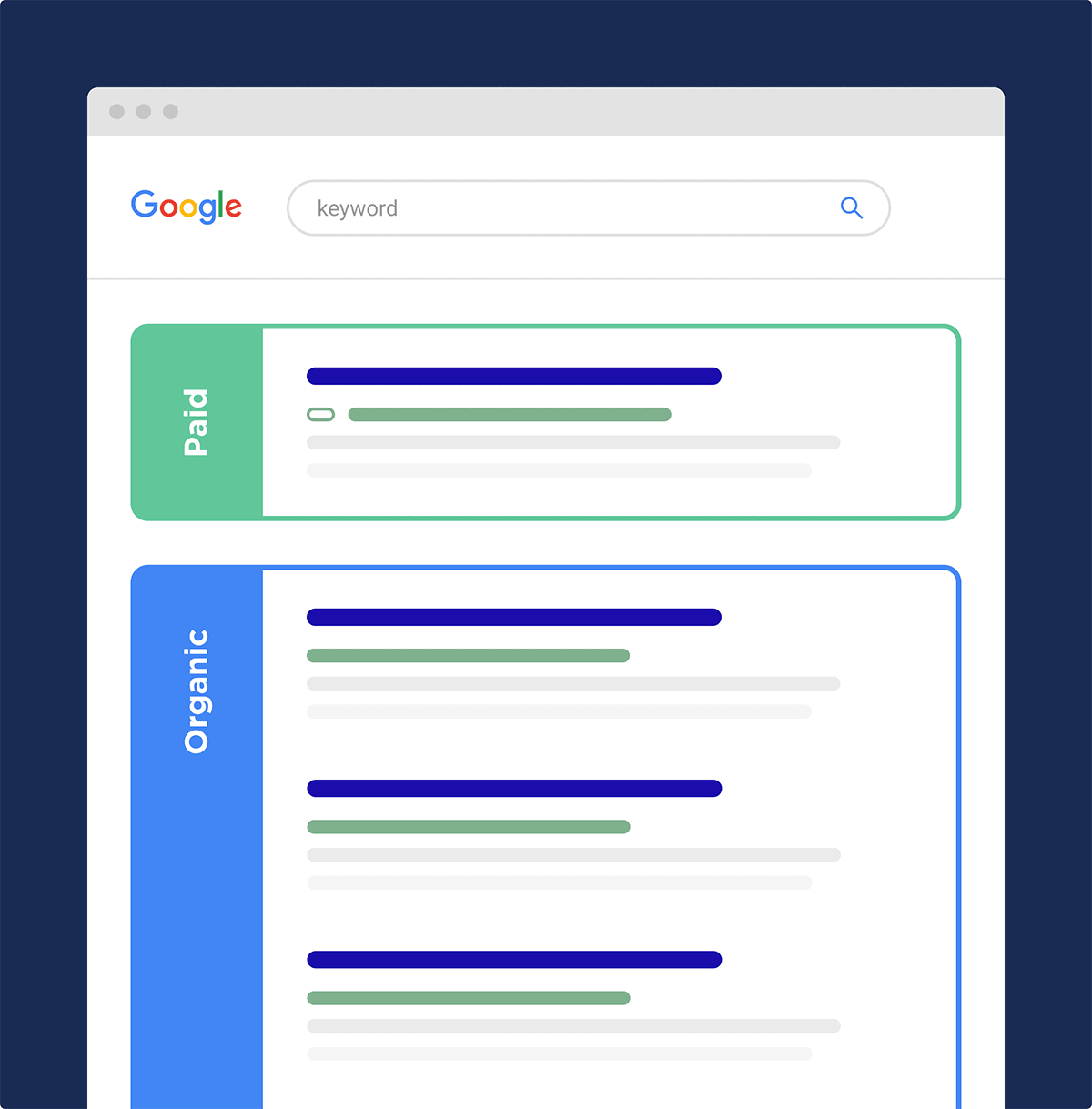
Image source: Backlinko
These paid tactics often involve bidding on keywords to have ads appear in search engine results when those keywords are searched.
What are the Google Ranking Factors?
Google uses a complex algorithm to rank websites. While there are around 200 factors considered, some of the most important ones include:
- High-Quality Content: Relevant, engaging and high-quality content is crucial. It should provide value to users and be updated regularly.Backlinks: The number and quality of backlinks to your site significantly influence your ranking.
- Mobile-Friendliness: Google places a high emphasis on mobile optimization, considering it a key ranking factor.
- Page Speed: Faster loading times lead to better user experience and higher rankings.
- Relevance and Freshness: Your content needs to be relevant to the search query and updated regularly.
- HTTPS: Secure sites (those that start with HTTPS) are favored by Google's algorithm.
- User Experience: Factors like easy navigation, readable text, and a clean design can improve your site's user experience and its ranking.
Remember, Google's ranking factors are all about providing the best possible results and experience for users.
Does Social Media Have an Impact on SEO Rankings?
No, social media metrics isn't a direct ranking factor in Google's algorithm, but that doesn't diminish their value. In fact, they play a crucial, albeit indirect, role in enhancing your SEO efforts. Here's how:
- Brand Visibility and Recognition: Consistent social media activity amplifies your brand's visibility, making it easier for people (and search engines) to find you.
- Increased Traffic: Every share on social media is a potential for someone to click through to your website, boosting your site's traffic.
- Link Opportunities: Great content shared on social media can catch the attention of influencers or other relevant websites who might link back to your site.
So, while Google may not directly count your likes and shares, a strong social media strategy can certainly fuel your SEO.
Does PPC Help Organic SEO Rankings?
Pay-Per-Click (PPC) advertising and organic Search Engine Optimization (SEO) are two separate strategies, and according to most sources, PPC does not directly influence organic SEO rankings.
Google itself has stated that a PPC doesn't improve your organic search rankings.
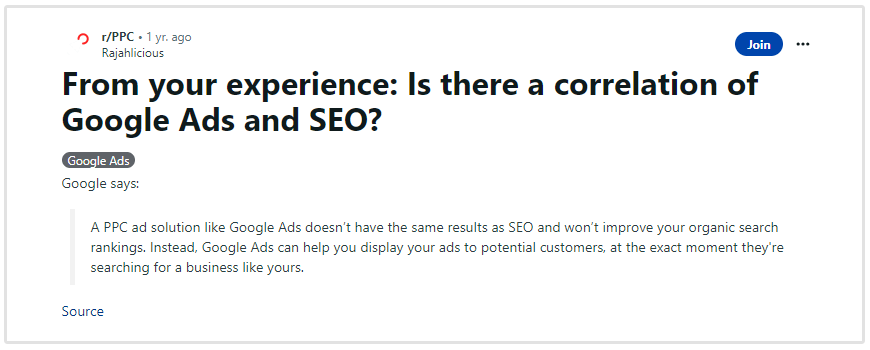
However, PPC can indirectly support your SEO efforts. For instance, PPC campaigns can help you discover valuable keywords for your SEO strategy. Additionally, if your paid ads effectively drive traffic to your site, your site's organic ranking could see an indirect benefit.
But remember, while PPC can complement SEO, it doesn't replace the need for a strong, organic SEO strategy.
Why Has My Organic Traffic Dropped?
If you've noticed a significant drop in your website's organic traffic, don't panic. It's not uncommon, and there are several reasons why this might happen. Here are some of the most common causes:
- Google Algorithm Updates: Google frequently updates its search algorithms. These updates can affect your site's ranking and, consequently, your organic traffic.
- Technical SEO Changes: Any changes to your website's structure, such as URL changes or issues with your robots.txt file, can impact your visibility on search engines.
- Site Migration: If you've recently moved your site to a new domain or changed your site's structure, it could lead to a temporary drop in traffic.
- Content Changes: Modifying existing content or adding new content that doesn't align with your target audience's interests can decrease organic traffic.
- Manual Actions and Penalties: If Google finds that your site violates its Webmaster Guidelines, it may apply manual actions that can significantly reduce your site's visibility.
- Technical Issues: Problems like slow site speed, mobile-unfriendliness, or broken links can negatively affect user experience and your SEO performance.
- Increased Competition: The online space is competitive. New competitors or improved strategies by existing ones can result in a loss of traffic.
To identify the exact cause, it's crucial to regularly monitor your site's performance using tools like Google Analytics or Google Search Console. Once you understand the issue, you can strategize a solution to regain your organic traffic.
Remember, fluctuations in organic traffic are normal. However, if you notice a consistent decline, it's vital to investigate and address the underlying issues promptly.
Technical SEO FAQs
What is Technical SEO?
Technical SEO refers to the process of optimizing your website for the crawling and indexing phase. It's about making your website easy to understand for search engines, so they can accurately rank your site in search results.
Key aspects include site speed, mobile-friendliness, and XML sitemaps, to name a few.
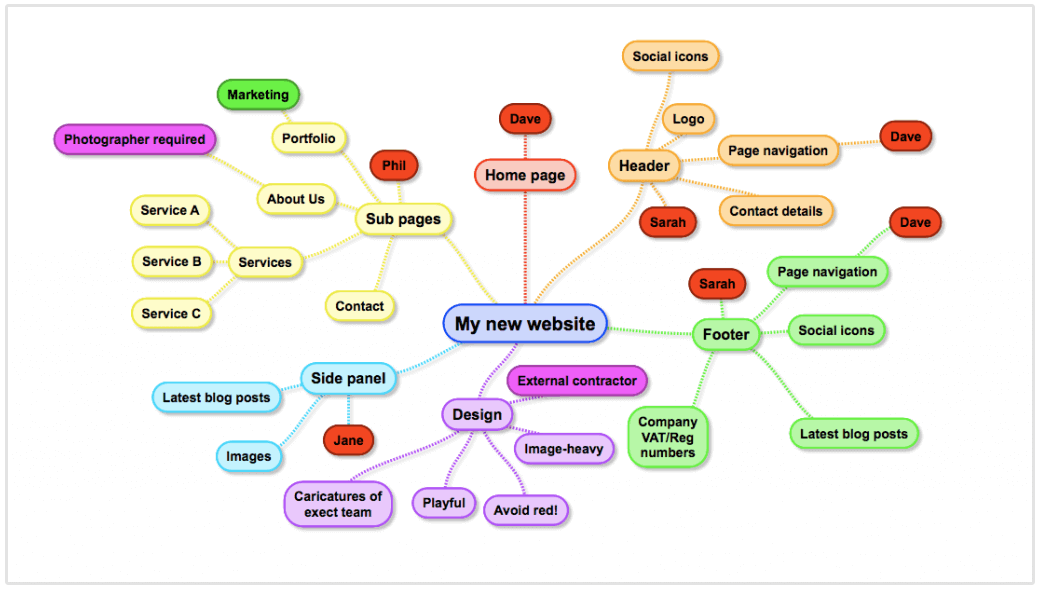
In a nutshell, technical SEO makes your site appealing to search engines, which can significantly improve your visibility.
What is a Google Penalty?
A Google penalty is an action taken by Google against websites that violate its guidelines.
It leads to a drop in your website's search rankings, affecting visibility and traffic. Penalties can be algorithmic or manual. Webmasters can avoid them by adhering to Google's quality guidelines for ethical SEO practices.
Does Site Speed Impact SEO Rankings?
Site speed is a significant factor in SEO rankings. Google has confirmed that a fast site helps you rank better. Therefore, the speed of your website influences how it will rank on Google and other search engines.
Fast-loading sites provide a better user experience. A slow site can lead to high bounce rates as users tend to leave if the page doesn't load quickly.
Google uses site speed as a ranking factor. A faster site can improve your position in the Search Engine Results Pages (SERPs).
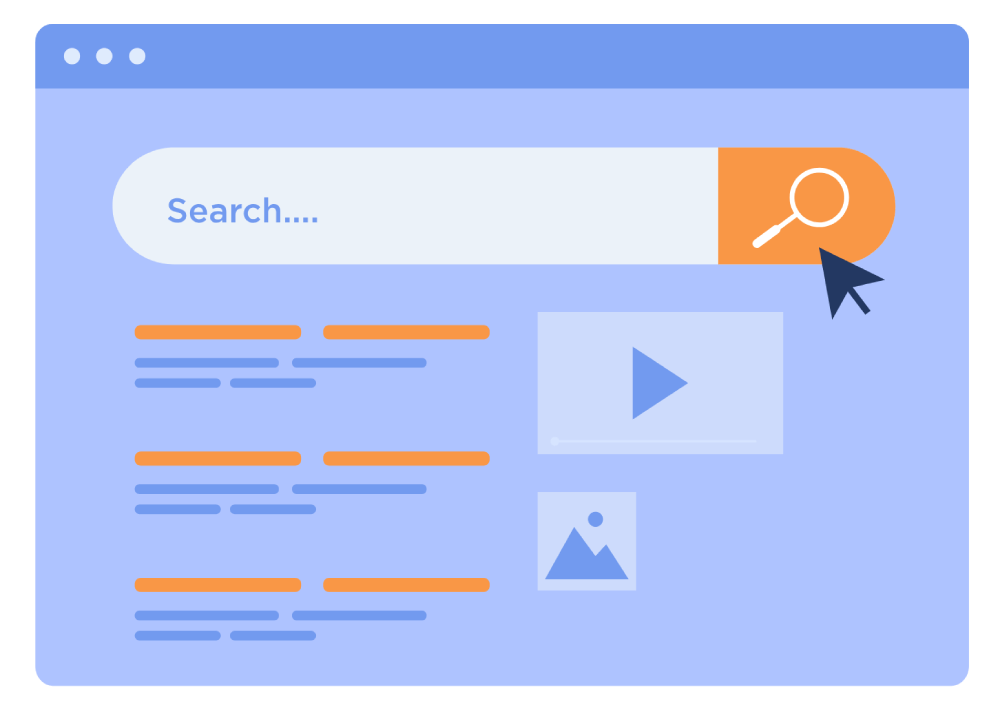
Additionally, with the rise of mobile browsing, site speed becomes even more crucial as users on mobile devices often expect quicker load times.
Improving your site speed is not just about better rankings; it's also a significant factor in your website's overall success. It enhances user experience, increases engagement, and can ultimately lead to higher conversion rates.
Will My Site Get Penalized for Duplicate Content?
Having duplicate content can confuse search engines, potentially preventing your page from ranking properly.
While it's not technically a penalty, it can impact your search engine rankings.
Even though penalties are rare, it's best to focus on creating unique, high-quality content to ensure optimum ranking.
On-Page SEO FAQs
What is On-Page SEO?
On-page SEO is the practice of optimizing individual webpages to rank higher and earn more relevant traffic in search engines. It's about perfecting both the content and HTML source code of a page, unlike off-page SEO which refers to links and other external signals.
Here are the key components of on-page SEO:
- Keyword Usage: Using relevant keywords in headings and throughout your content is vital. Google uses these to determine the relevance of your website to specific search queries.
- Content Quality: Providing valuable, high-quality content that satisfies user intent is crucial. The better your content, the better your chances of ranking highly.
- Meta Tags: Optimizing title tags and meta descriptions helps tell search engines what your page is about.
- URL Structure: A clear and concise URL structure helps search engines understand the content of the page.
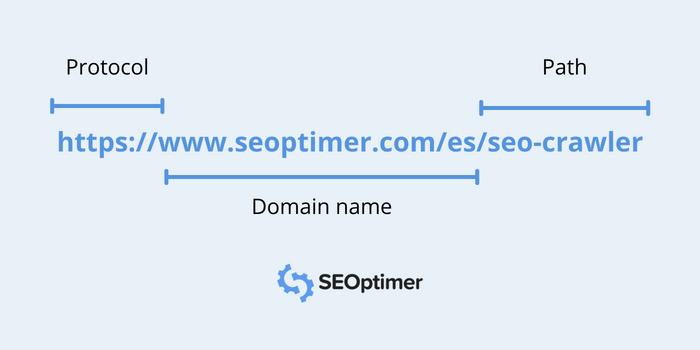
- Internal Linking: This helps guide users through your site and can also help improve your site's visibility in search engine results.
- Page Loading Speed: Faster loading pages provide a better user experience and are more likely to rank highly in search results.
What is the Difference Between an Internal Link and an External Link?
An internal link is a hyperlink that directs to another page on the same website. On the other hand, an external link is a hyperlink that points to a different website altogether.
Both types of links are crucial in SEO strategy: internal links enhance user experience and site architecture, while external links improve credibility and authority.
How Long Should My Blog Posts Be?
The optimal length for your blog post depends on your audience, topic, and goals. However, research generally suggests that longer, in-depth posts tend to rank higher in search engine results.
Here's a quick guide:
- Short Posts (300-600 words): Great for quick updates or brief overviews.
- Medium-Length Posts (600-1200 words): Ideal for providing more detailed insights on a topic.
- Long-Form Content (1200+ words): Best for comprehensive guides or deep dives into complex subjects.
Remember, quality always trumps quantity. Whether short or long, make sure your content is relevant, valuable, and engaging to your readers.
What is Meant by SEO-Friendly Content?
When we talk about "SEO-friendly content", we're referring to content that's specifically designed to perform well in search engine rankings. This type of content is more than just informative and engaging; it's strategically crafted to appeal to both your audience and search engines.
SEO-friendly content incorporates relevant keywords and phrases that your target audience uses when they search for the products or services you offer. These keywords should be naturally woven into your content to help search engines understand what your content is about.
Search engines like Google prioritize content that provides value and a good user experience. This means your content should be easy-to-read, engaging, and useful to your audience.
Including both internal links and external links to reputable sources can enhance your SEO.
Optimized meta descriptions and title tags are vital for SEO. They give search engines a snapshot of your content's relevance, increasing the chance of ranking higher.
With the majority of searches happening on mobile devices, ensuring your content is mobile-friendly is essential for SEO.
By incorporating these elements, you can create SEO-friendly content that not only attracts visitors but also turns them into customers. Remember, the goal of SEO-friendly content is to attract, engage, and convert your audience while satisfying search engine algorithms.
How Can I Find the Best Keywords for SEO?
Finding the right keywords for SEO involves understanding what your audience is searching for and how these search terms align with your content. The process can be broken down into four simple steps:
- Begin with a Seed Keyword: This should be a term that's relevant to your business or industry. It serves as a starting point for generating related keywords.
- Analyze the Suggestions: Once you have a list of related keywords, examine their search volumes and competitiveness. These insights will give you a sense of which keywords have the potential to attract substantial traffic to your site.
- Select Appropriate Keywords: Aim for a balance of high-volume keywords and long-tail keywords in your selection. While high-volume keywords have more searches, they're also more competitive. Conversely, long-tail keywords have fewer searches but can be easier to rank for, often attracting more targeted traffic.
- Implement the Keywords: Incorporate the chosen keywords into various elements of your website, such as the content, meta tags, URLs, and image alt texts.
Tools like Seoptimer's Keyword Research Tool can help you discover relevant keywords, providing valuable insights into search volumes and competition levels, thus simplifying the keyword research process.
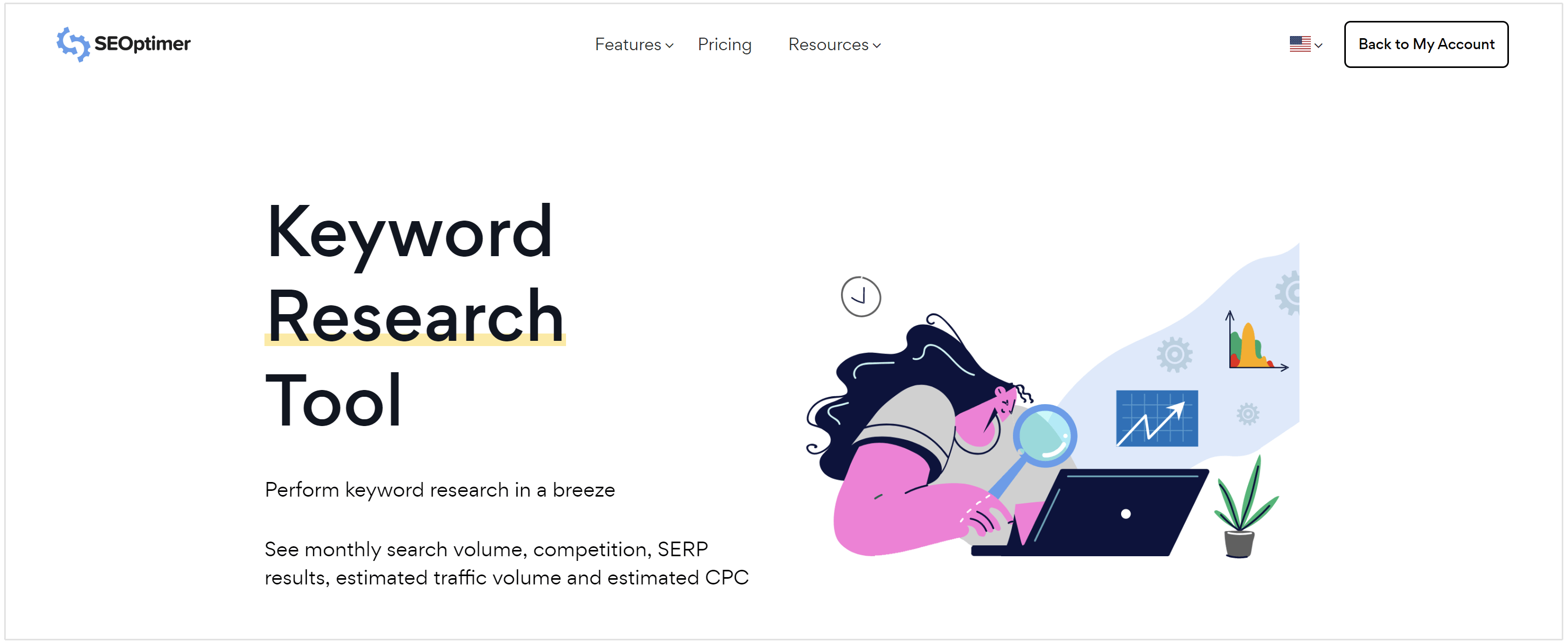
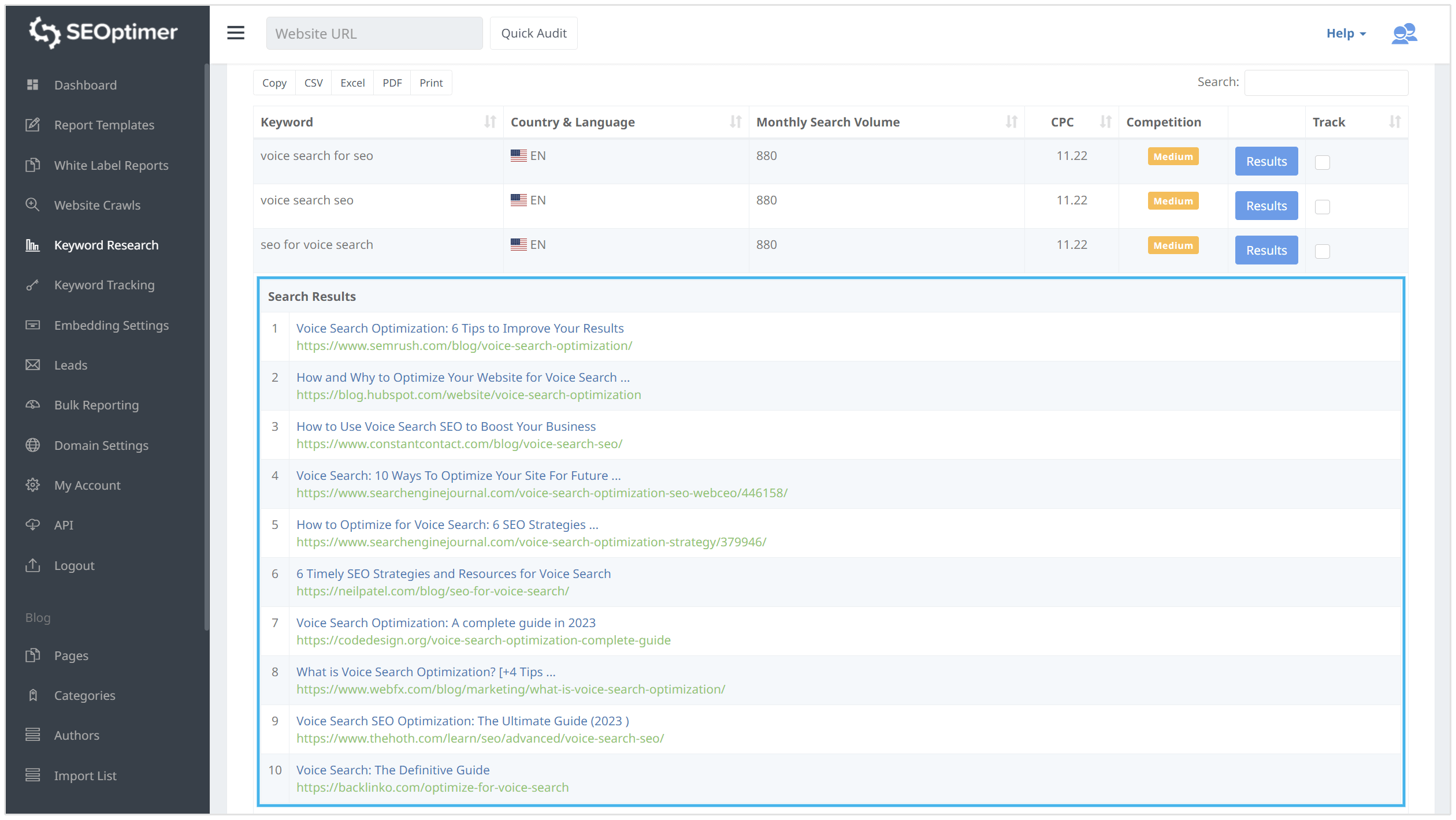
Off-Page SEO FAQs
What is Link-Building?
Link-building is a powerful SEO strategy that involves acquiring hyperlinks from other websites to your own. These links act like votes of confidence, signaling to search engines that your content is valuable and trustworthy.
By strategically building high-quality backlinks, you can boost your website's visibility in search engine results, driving more traffic and enhancing your online authority.
Remember, it's not just about quantity— the quality and relevance of your backlinks are key to effective link-building.
Should I Buy Backlinks for SEO?
Buying backlinks for SEO is a controversial topic. While some argue that it can be a quick way to gain more traffic, the consensus among most SEO experts is that it's risky and potentially harmful to your site's long-term success.
Google and other search engines strongly discourage the practice of buying links. If they detect you're doing so, your site could be penalized, leading to lower rankings.
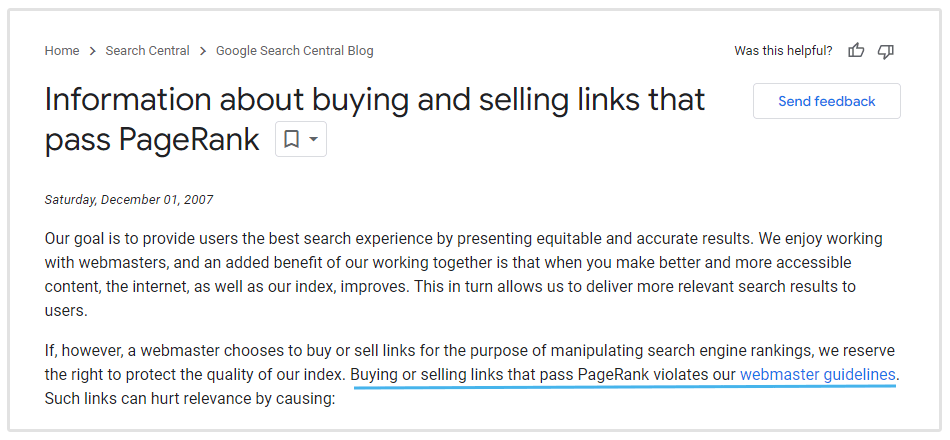
Cheap, bulk-purchased backlinks often come from disreputable sources and may not offer any real value. Furthermore, paid links can appear unnatural and could potentially harm your site's reputation with both search engines and users.
Instead of buying backlinks, consider focusing on earning them naturally through high-quality content, strategic partnerships, and organic outreach. This approach may take longer, but it's more likely to yield sustainable, long-term benefits for your SEO efforts.
How Can I Build Links to My Website?
Building quality backlinks to your website is a crucial part of SEO strategy. The best way to get more sites to link to you is by creating high-quality, unique content that others will naturally want to reference and link to, and tell people about it.
Here are some other effective methods:
- Guest Blogging
- Broken Link Building
- Backlink Outreach
- Competitor Analysis
What is Broken Link Building?
Broken link building is a strategic SEO technique that involves finding broken (non-working) links on websites, creating relevant content to replace the broken resource, and then reaching out to the website owner to suggest replacing the broken link with your new and improved content.
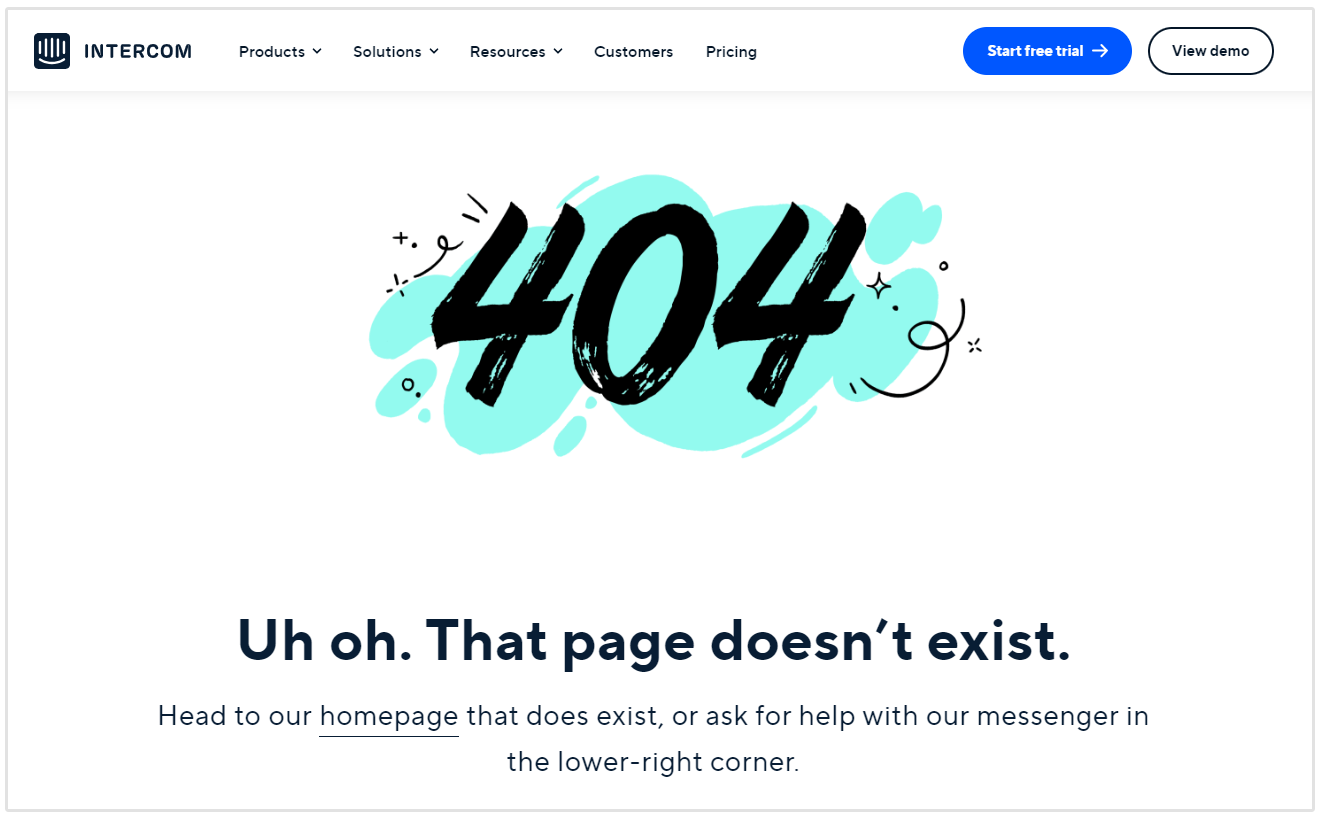
Here are two key reasons why it's a good link building technique:
- Win-Win Situation: It helps webmasters improve their site's user experience by fixing broken links, while you gain a backlink. It's a mutual benefit!
- Quality Backlinks: Often, the broken links you're replacing were linked because they provided valuable information. When you create high-quality replacement content, you can earn a backlink from a reputable source, boosting your own site's authority.
Broken link building is an effective way to build quality backlinks, which can significantly improve your website's SEO performance.
What Makes a Backlink High-Quality?
A high-quality backlink possesses the following characteristics:
- Relevance: The link comes from a site that is in the same niche or talks about the same subject as your site.
- Authority: The backlink originates from a reputable website with a high domain authority rating.
- Placement: The most valuable backlinks are editorially placed within the content, not in the footer or sidebar.
- Natural: High-quality backlinks are acquired naturally, indicating they were earned due to the quality of content.
- Contextually Relevant: A quality backlink fits within the context of the rest of the page.
A high-quality backlink is natural, relevant, and comes from an authoritative source.
Local SEO FAQs
What is Local SEO?
Local SEO is a powerful online marketing strategy that positions your business offerings in front of local customers precisely when they're searching for them.
This strategy is all about optimizing your online presence to appear in local search results when customers are looking for businesses like yours in their vicinity.
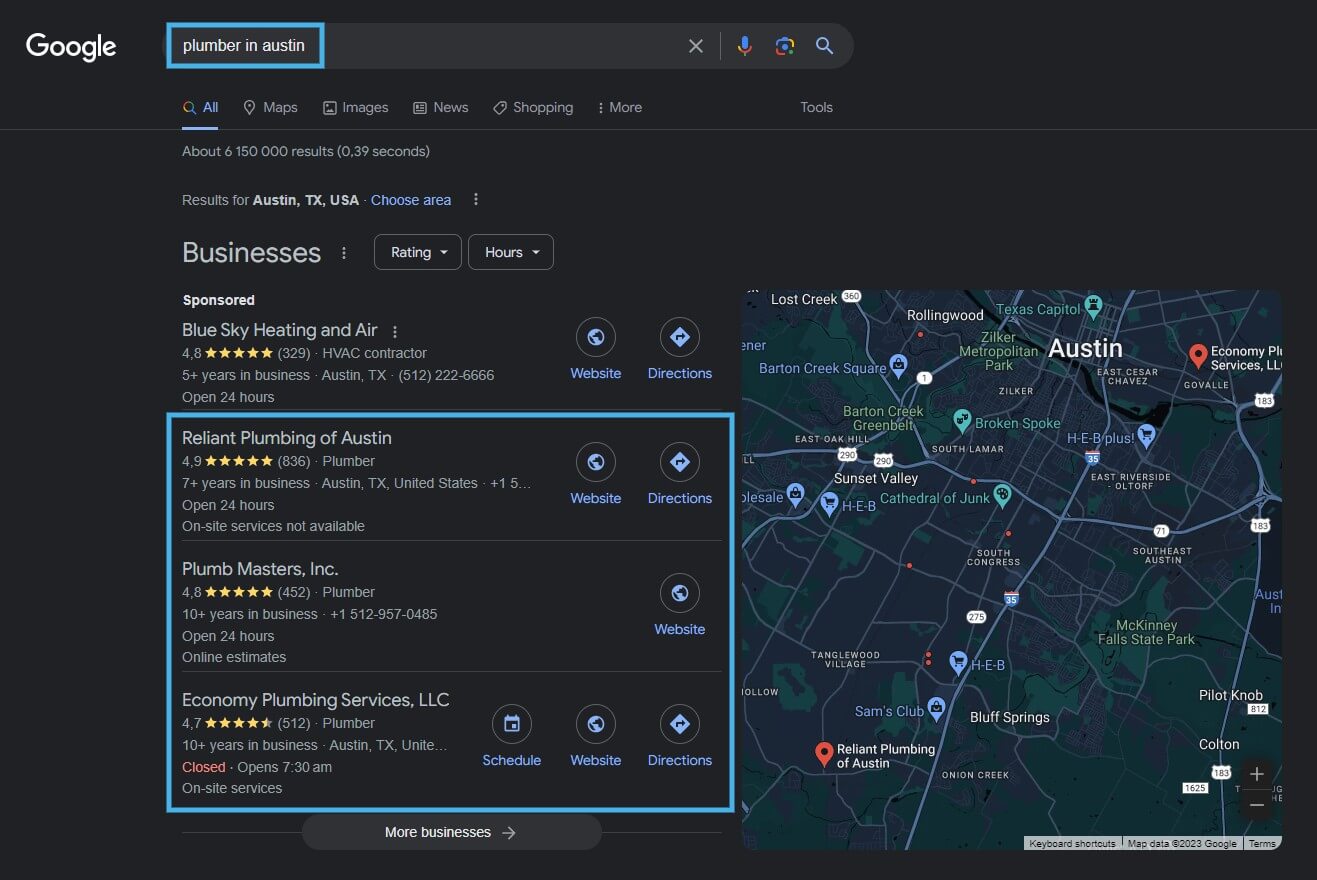
A key component of this strategy is having a well-optimized Google My Business profile, which appears in local search results. This profile acts as your business's digital storefront, showcasing crucial details like your address, hours of operation, and services offered.
Local SEO helps you be where your local customers are and effectively directs them towards your business. It's a potent tool for small businesses looking to compete with larger competitors at a local level.
What are the Most Important Local SEO Ranking Factors?
Based on recent surveys and reports, the most important local SEO ranking factors are:
- Google My Business (GMB) Profile: This includes factors like GMB category and the completeness of the profile.
- On-Page Signals: These include the presence of NAP (Name, Address, Phone Number), keywords in titles, domain authority, and others.
- Google Reviews: Quantity and diversity of Gogole reviews play a significant role.
- Online Citations: Consistent and accurate citations across various online directories can help boost your local search ranking.
- Localized Content: Tailoring your content to your local audience can also improve your local search visibility.
Remember, these factors are interconnected, and success in local SEO requires a balanced approach that addresses all of them.
Should I Hire an SEO?
Hiring an SEO consultant or agency can provide numerous benefits:
- Expertise: They have extensive knowledge and experience in improving website rankings.
- Time-efficient: They can save you time, allowing you to focus on other aspects of your business.
- Results-oriented: They use proven strategies and methodologies to deliver tangible results.
- Stay Updated: They keep up with the latest algorithm changes and SEO trends.
However, if you're passionate about learning and have the time to invest, you can certainly learn SEO yourself. There are many resources available online to get you started. The journey might be challenging, but it's definitely rewarding as you'll gain a valuable skill that can significantly improve your website's performance!
Conclusion
This concludes our list of top SEO FAQs. Understanding and implementing SEO is an ongoing journey rather than a one-time task.
The digital landscape continually evolves, and so do SEO strategies. It's crucial to stay informed and adapt your tactics accordingly.
Whether you choose to hire a professional or take the DIY path, remember that the key to SEO success lies in consistency, patience, and continuous learning.
For those eager to expand their knowledge, SEOptimer's blog serves as a comprehensive resource hub. Here, you'll find a wealth of information, tips, and insights to help you navigate the world of SEO effectively.



